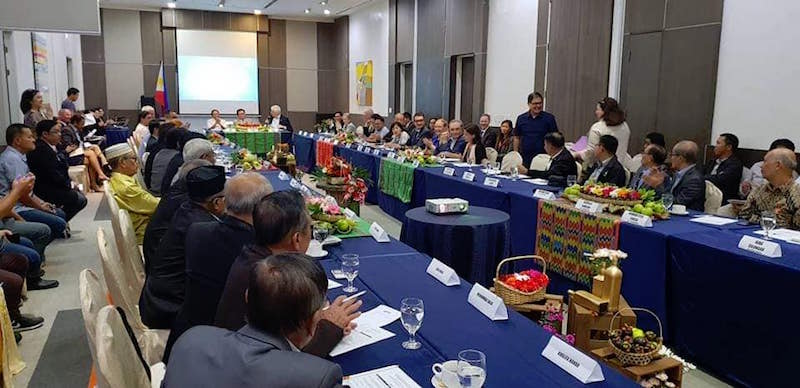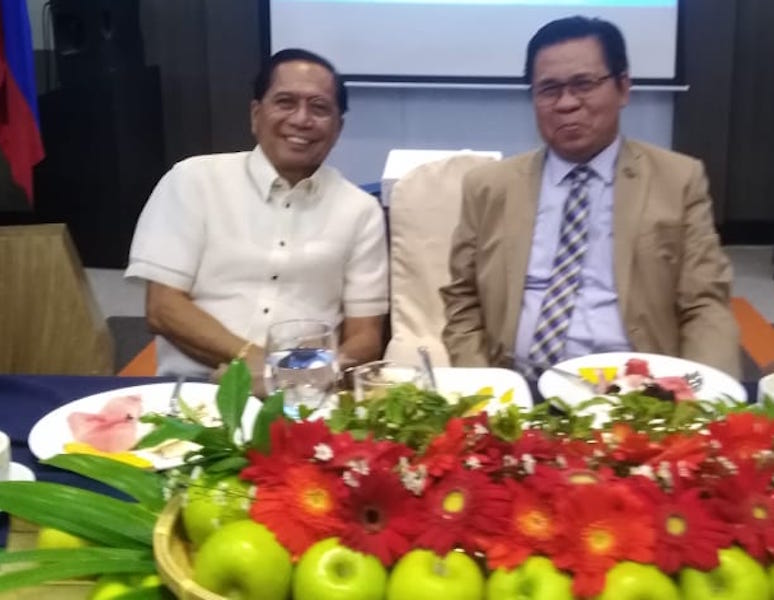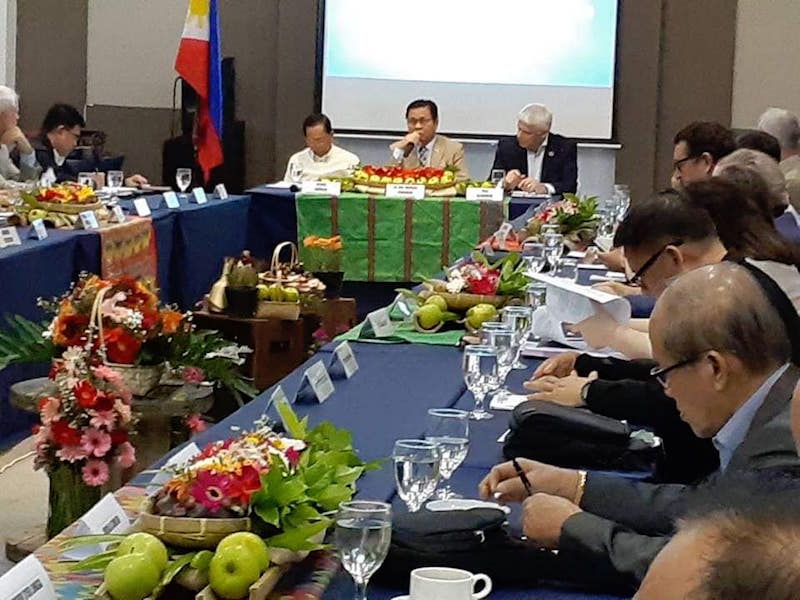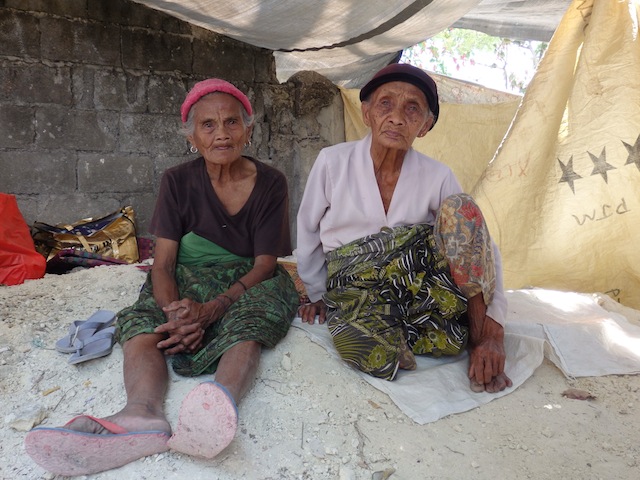DAVAO CITY (MindaNews / 13 October) — It was a “very historic conference,” the representative of the Canadian Embassy said as the chair of the Moro Islamic Liberation Front (MILF) briefed international development partners, among them six Ambassadors, on the future Bangsamoro government, and presented a10-point priority program to meet the “huge challenges” in their transition from rebellion to governance and from the Autonomous Region in Muslim Mindanao (ARMM) to the Bangsamoro Autonomous Region in Muslim Mindanao (BARMM).
The “Conversation between Moro Islamic Liberation Front chair Al Haj Murad Ebrahim and Development Partners,” held at the Park Inn by Radisson Hotel here, last Thursday came three months ahead of the January 21, 2019 plebiscite to ratify RA 11054 or the Organic Law for the Bangsamoro Autonomous Region in Muslim Mindanao. RA 11054 is the enabling law of the Comprehensive Agreement on the Bangsamoro (CAB), the peace agreement that government and the MILF signed on March 27, 2014.
 Moro Islamic Liberation Front chair Al Haj Murad Ebrahim meets with international development partners at the Park Inn hotel in Davao City on 11 October 2018. Photo courtesy of MILF Chair’s office
Moro Islamic Liberation Front chair Al Haj Murad Ebrahim meets with international development partners at the Park Inn hotel in Davao City on 11 October 2018. Photo courtesy of MILF Chair’s office
Murad said the plebiscite, which he described as the “one final hurdle” towards the establishment of the Bangsamoro government, will “make or unmake our decades of negotiations as well as peacemaking.”
In his 27-minute speech, Murad, the MILF’s nominee to be Chief Minister under the MILF-led, 80-member Bangsamoro Transition Authority (BTA) that would be appointed by President Rodrigo Duterte to govern the Bangsamoro during the transition from 2019 to 2022, presented to the audience of development partners from 11 countries, as well as from the United Nations, European Union and the World Bank what Presidential Adviser on the Peace Process Jesus Dureza described as the “State of the BARMM Address.”
“I just heard what is equivalent to a State of the Nation address delivered by the President of the nation, now we call it the State of the BARMM Address because it dissects clearly the expectations, the challenges and the areas where we have to work very closely,” said Dureza, who sat at the Presidential table beside Murad and UN Resident Coordinator Ola Almgren, who convened the meeting.
 Presidential Adviser on the Peace Process Jesus Dureza and MILF chair Al Haj Murad Ebrahim recall their days as peace panel chairs negotiating across the table from 2001 to 2003 as they look forward to their partnership under the Duterte administration. MindaNews photo by CAROLYN O. ARGUILLAS
Presidential Adviser on the Peace Process Jesus Dureza and MILF chair Al Haj Murad Ebrahim recall their days as peace panel chairs negotiating across the table from 2001 to 2003 as they look forward to their partnership under the Duterte administration. MindaNews photo by CAROLYN O. ARGUILLAS
Dureza and Murad sat across the negotiating table as chairs of the government and MILF peace panels from 2001 to 2003, when the peace talks resumed under the Arroyo administration, after the “all out war” waged by the Estrada administration in 2000. Murad was then Vice Chair for Military Affairs and Chief of Staff of the MILF’s Bangsamoro Islamic Armed Forces (BIAF).
The BIAF’s current Chief of Staff, Sammy Al Mansoor, and other members of the MILF Central Committee and agencies were also present during the “Conversation.”
“As we prepare for the transition into the Bangsamoro Government, it is best to keep in mind that the Bangsamoro still lags behind the rest of the country in many human development indices,” Murad said, citing the poverty incidence that remains highest in the region “which is more than triple than that of the national average” and the “poor bottom of literacy rate” at 86.1% compared to other regions like neighboring Region 12, also referred to as Soccsksargen, “where 90% is their lowest (and the) national average is at 96.5%.”
He cited more statistical data from the ARMM, the core territory of the proposed Bangsamoro, which will be abolished upon the ratification of the Bangsamoro: only 32 percent of its population have access to safe water, its inflation rate of 8.1% for August this year surpasses the national figure of 6.4% “making our population spend 60 percent of their earnings much on food and cut-off on other urgent needs such as health and education.”
“Our people still struggle to access clean water and electricity,” Murad said, noting that even as Lake Lanao is the source of hydroelectric power for around 68% of Mindanao’s electricity requirements, “our electricity supply is unreliable and expensive compared to major Mindanao cities and selected Asian countries.”
“Our life expectancy rate is at 59 for male and 61 for female. The second leading cause of death for male adult is gunshot wounds leaving behind them orphans and widows,” he said.
“Appalling and it is extremely painful to look at these numbers,” Murad said, adding it is “almost paradoxical that we wallow in poverty amidst an abundance in natural resources.”
From rebellion to governance, ARMM to BARMM
Murad admitted they are faced with “huge challenges” as they transition from armed to democratic struggle, particularly on how to “ensure a responsive and timely program for around 30,000 to 40,000 of our combatants who will undergo the decommissioning process.”
“The first recipient of the true dividends of peace must be these individuals and their communities,” he said, adding there are still “thousands of reserve and irregular members of the BIAF who will likewise have to be converted to productive civilian population.”
In the transition from ARMM to BARMM, he said they “will need to learn a lot of new skills to be able to effectively manage this transition.”
Murad explained that phasing out the ARMM bureaucracy and installing the new Bangsamoro civil service “must be perfectly synchronized to avoid disruption in service delivery,” that “effectively performing civil servants are made available, new arrivals are fully capacitated and those who are separated get appropriate severance (pay).”
Murad also expressed concern over a major challenge: financing the Bangsamoro Transition Authority (BTA).
“We cannot successfully kick start a government that will make a marked difference in the lives of our people if there is no infusion of new money into the region,” he said.
Because the Bangsamoro has yet to be ratified, it cannot be included in the proposed 2019 General Appropriations Act. Instead, it will inherit the P32-billion budget approved for the ARMM in 2019.
Murad hopes the BTA, which would run a ministerial form of government, would be able to receive next year the Special Development Fund (SDF) and block grant provided for under RA 11054.
The SDF is 50 billion pesos at 5 billion per year for 10 years from the ratification of the law.
The block grant is equivalent to 5 % of the net national internal revenue tax collection of the Bureau of Internal Revenue and net collection of the Bureau of Customs.
“We cannot just inherit the regular programmed resources of the current ARMM for this leaves us without flexibility to respond to emerging and new priorities. Here, we will need the assistance of our good friend Sec Jess to make this point clear to our partners in government. A further step into this will be the complementation of our effort from our development partners to achieve a perfect complementation in our efforts and avoid duplicity,” he said.
Vision
Murad also articulated the need to provide an “inspiring leadership with a well-entrenched vision for the Bangsamoro.”
“This vision should reflect and articulate the aspirations of our people and should be broad enough to cover everyone and yet so close to each of us so that we can identify with it. This vision should galvanize everyone to rally behind a cause far larger than ourselves and inspire the youth to contribute their share in nation building,” he said, stressing they will be leaders of the Bangsamoro and not just of the MILF or its political party, United Bangsamoro Justice Party (UBJP).
 Al Haj Murad Ebrahim, chair of the Moro Islamic Liberation Front delivers a 27-minute speech before the international donor community at the Park Inn hotel in Davao City on 11 October 2018. Presidential Adviser on the Peace Process Jesus Dureza said it sounded like a State of the BARMM Address. Photo courtesy of the MILF Chair’s Office
Al Haj Murad Ebrahim, chair of the Moro Islamic Liberation Front delivers a 27-minute speech before the international donor community at the Park Inn hotel in Davao City on 11 October 2018. Presidential Adviser on the Peace Process Jesus Dureza said it sounded like a State of the BARMM Address. Photo courtesy of the MILF Chair’s Office
He laid down the ten priorities in their transitions from a revolutionary organization to one tasked with governance and the transition from the ARMM to the BARRM:
- enact priority measures mandated by the Bangsamoro law such as Electoral Code, Civil Service Code, Administrative Code and other legislations that need to be enacted during the BTA;
- review and integrate the Bangsamoro Development Plan, the Regional Development Plan of ARMM, the Camp Transformation Plan and other Bangsamoro plans to make them responsive to the current needs;
- study and design the appropriate bureaucracy for the Bangsamoro Government to ensure the right balance between the size of the bureaucracy and the services that need to delivered as well as the appropriate skills required of people in the bureaucracy;
- set up programs that will respond to the pressing social and economic challenges in the Bangsamoro such as poverty, education, health, access to clean water and electricity, job opportunity, agricultural productivity, and access to capital market. “These must be complemented with responsive strategic infrastructure in the region such as ports, road network, flood control, and logistics and communication facilities,” he said.
- special programs for transitioning combatants and their families apart from regular programs of the government like 4Ps, Philhealth, among others “to ensure that these programs are tailored fit to their needs so that they will become productive members of the society;”
- rehabilitation and reconstruction of Marawi. “Marawi must be quickly rehabilitated and reconstructed as every delay is an opportunity for violent extremism to use it for propaganda and recruitment. Besides, immediate rehabilitation of Marawi is both the right and just thing to do,” Murad explained.
- develop policy environment on transparency, accountability, and prudent fiscal policy as well as improvement on revenue generation.
- energy development and power generation improvement to support the development of industries that will generate jobs and other opportunities.
- enhance security by “maximizing the utilization of available legitimate forces on the ground and leveraging on the network of the MILF in the Bangsamoro communities by deploying such joint forces such as the JPSTs (Joint Peace and Security Teams); and
- ensure a productive partnership between the Bangsamoro Government and Development partners as well as the national government to ensure complementation of programs to maximize results.
Murad asked Almgren, the UN Resident Coordinator to “continue to host and make this a regular forum for our continuing engagement” and proposed that a “permanent Secretariat jointly organized from the donors and the MILF structures” be set up to allow “the gradual integration of some of our people so that a transfer of technology may allow us to continue this forum when the BTA is established.”
“Very historic”
In his welcome remarks, Almgren explained that the participation to the first Conversation with Murad “is not an exclusive group” but they are merely starting with a “smallish group” that will accompany the process.
Most of those who participated have had previous engagements with the Bangsamoro peace process. Aside from the UN, EU, World Bank, embassies represented were Australia, Brunei, Canada, Japan, Malaysia, Netherlands, Norway, Switzerland, Turkey, United Kingdom and Spain through AECID, the Spanish Agency for International Development Corporation,
The Ambassadors who attended were Australia’s Amanda Gorely, Norway’s Bjorn Jahnsen, Switzerland’s Andrea Reichlin, Turkey’s Esra Cankonur and United Kingdom’s Daniel Pruce and the European Union’s Franz Jessen.
Dureza said the presence of so many partners is “already an indication that maybe we can see a fruition of our dreams together, no longer as enemies across the table but already on the same side of the table.”
Dureza also announced that government would welcome independent monitors for the January 21, 2019 plebiscite on the Bangsamoro.
Juan Pita, Coordinator-General of the AECID, discussed the importance of harmonizing support among development partners. “The fact that we are here together, so many international partners, in expressing our solidarity and cooperation” to help transform the plans into reality is “great news” and “great opportunity to move forward.”
Stephen Weaver, head of cooperation of the Canadian Embassy, described the meeting as a “very historic conference” and expressed appreciation to the “very, very frank, open conversations we have today.” He noted that Murad’s statement which was “very clear on challenges and priorities” was a “fantastic start for a conversation.”
He said the meeting would help them “harmonize” their support and announced they would continue supporting education and health concerns.
Failure is no option
Murad responded that they need to ensure that all the priorities would be attended to because “we know that among the priorities there are already donors presently working but as I’ve said, we need to be commensurate in all these priorities we have so that’s the reason why we give you all the priorities and maybe it is the individual decision of every donor where among these priorities that they can focus more in order to balance the efforts and become complementary because all the priorities we enumerated are equally important in moving forward especially during this transition period.”
He acknowledged that the “big challenge for us is to show to our people there is a difference between what happened in the past and what will happen now in the present situation.”
 NEVER-ENDING. Sisters Saria Namayo (left) and Cartiquia Cartin (right) of Barangay Elian, Datu Saudi Ampatuan, have lived a life of never-endlng evacuations. The sisters hope peace would come so they can return home. MindaNews photo taken during an evacuation in March 2015 by Carolyn O. Arguillas
NEVER-ENDING. Sisters Saria Namayo (left) and Cartiquia Cartin (right) of Barangay Elian, Datu Saudi Ampatuan, have lived a life of never-endlng evacuations. The sisters hope peace would come so they can return home. MindaNews photo taken during an evacuation in March 2015 by Carolyn O. Arguillas
For Murad, failure is not an option.
“If we fail in this, I think it will be very difficult to have another opportunity as this. On our side we will be exhaust every effort in order that we will succeed,” he said.
On Friday afternoon, at the meeting of the Insider Mediators, a platform for Bangsamoro men and women from various sectors who try to work within their respective organizations to achieve a wider consensus on major Moro issues such as the Bangsamoro law, federalism and Marawi rehabilitation, Murad said there must be “something new” and “something better” that the Bangsamoro government will offer to the Moro people “otherwise we cannot claim to have succeeded.”
If the Bangsamoro government is not successful, he said, this will strengthen groups leaning towards violent extremism.
“The real solution now is we have to succeed Insha Allah because if we don’t, then these groups will be strengthened,” he said. (Carolyn O. Arguillas / MindaNews)
